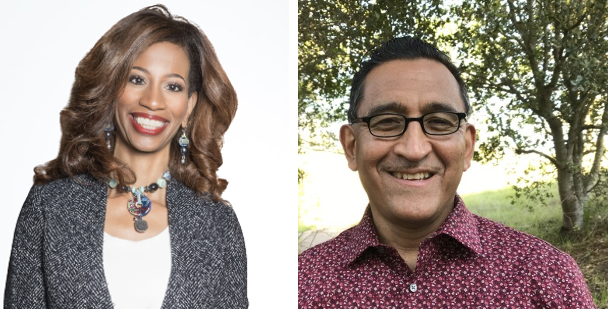
Hello, we are Drs. Angelicque Tucker Blackmon and David Sul, independent evaluation consultants and members of the AEA STEM TIG.
Historically, BIPOC candidates have been excluded at some point along their journey within the STEM ecosystem (Figure 1), which often results in STEM evaluators “othering” excluded BIPOC STEM program participants and categorizing them as different from the norm. Through seemingly supportive terms (e.g., inclusive, broadening participation), STEM evaluators center “mainstream” ideas. For example, “mainstream” STEM inclusionary efforts attempt to integrate those excluded individuals into STEM ecosystems (Figure 2). Comparably, broadening participation efforts in STEM redefine it’s environment with expansive concepts and methods, shuttling previously ostracized candidates into a loosely-defined “mainstream” STEM ecosystem (Figure 3).

But why would those from historically excluded groups want to be a part of the very STEM ecosystem that excluded them in the first place? While aware of these complex sociohistorical factors, how do we move forward as STEM evaluators?
We choose to question the very structures of STEM ecosystems by transitioning towards a liberatory model of STEM ecosystems and situate the act of trust building as central to these aspirational liberatory STEM ecosystems.
Lessons Learned
The development and building of trust within STEM ecosystems is not automatic and may require Historical Honesty and Radical Redress. STEM evaluators should learn an honest history that explains the intergenerational trauma suffered by BIPOC participants of STEM programs. To offer Radical Redress, STEM evaluators must search deeply within their profession to correct wrongs and make restitution for the acts committed by previous evaluation professionals. Rather than utilizing an othering or deficit framing, STEM evaluators can center the self-determined assets of BIPOC participants. STEM evaluation participants need to know that STEM evaluators truly understand historical harm and are working in tangible, constructive ways away from it.
Building trust within BIPOC communities requires consistency and patience. The building of trust must be constant and it will take time. This may mean that at the beginning of one’s evaluation process, unless trust building is taken into account within the evaluation plan, it may not proceed according to schedule. However, centering the building of trust may accelerate the latter stages of an evaluation plan. In addition, the resulting established trust can support the gathering of authentic and true perspectives of STEM evaluation participants leading to more valid information. Trust building must be sustained even during difficult conversations and challenges to one’s evaluation practices.
Vulnerability is valued in the building of trust and may require a STEM evaluator’s willingness to move from behind the shield of their positions and titles. To unearth deep rooted bias, STEM evaluators should embrace alternate forms of engagement that center the perspectives of program participants even if it feels clumsy or awkward. Building of trust does not mean we hold STEM evaluators to unattainable standards thus precluding them from mistakes. However, the subsequent behaviors and perspectives after a mistake subjects their level of commitment to trust building to BIPOC participants’ scrutiny.
Under the guise of objectivity, STEM evaluators present a distant, removed, and aloof persona to STEM participants. Attending only evaluation meetings or yearly site visits can affect one’s understanding of the nuances within evaluation data. Through enthused engagement, STEM evaluators can demonstrate commitment to building trust, and willingness to bring forth their specialized knowledge in support of others and thus generate pathways for increased trust and broader participation in liberatory STEM ecosystems.
Rad Resources
- What we not finna do: Respectfully collaborating with skinfolk and kinfolk in Black Feminist Participatory Action Research
- Transforming the paradigm for LGBTQ+ evaluation: Advancing a praxis of LGBTQ+ inclusion and liberation in evaluation
The American Evaluation Association is hosting STEM Education and Training TIG Week with our colleagues in the STEM Education and Training Topical Interest Group. The contributions all this week to AEA365 come from our STEM TIG members. Do you have questions, concerns, kudos, or content to extend this AEA365 contribution? Please add them in the comments section for this post on the AEA365 webpage so that we may enrich our community of practice. Would you like to submit an AEA365 Tip? Please send a note of interest to AEA365@eval.org. AEA365 is sponsored by the American Evaluation Association and provides a Tip-a-Day by and for evaluators. The views and opinions expressed on the AEA365 blog are solely those of the original authors and other contributors. These views and opinions do not necessarily represent those of the American Evaluation Association, and/or any/all contributors to this site.
